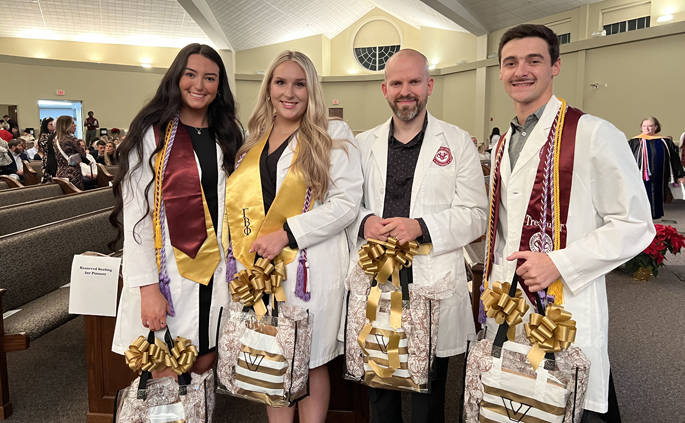Editor’s note — the following is a roundup of the news that made headlines at Vanderbilt University Medical Center in 2016.
Transition complete
Vanderbilt University Medical Center (VUMC) began operating as a fully independent, nonprofit entity, following the completion of the legal transaction on April 30 that separated it legally and financially from Vanderbilt University. The transition positions VUMC for future growth and investment, while preserving its tightly woven connections to the University in research and teaching.
“While we are now optimally positioned for the future of health care delivery, we have taken care to assure VUMC will remain seamlessly connected to Vanderbilt University in fundamental ways, including a vast array of educational and research programs aimed at training the leaders of the future and driving innovation through discovery science,” said Jeff Balser, M.D., Ph.D., president and CEO of VUMC and Dean of Vanderbilt University School of Medicine.
The restructuring of Vanderbilt University and VUMC began in November 2014.
Strategic Compass
In his State of the Medical Center address this fall, Balser described a “Strategic Compass” to help the Medical Center continue to “grow and shine” in the years to come.
Balser outlined VUMC’s four key priorities for the coming year: workforce engagement, academic performance, strategic growth and EpicLeap. He said for VUMC to remain a leader in health care, the organization must constantly focus on key priorities, and these four areas would continue to be top priorities throughout this fiscal year.
“With the change in our governance this spring, all of us now own VUMC — it will be what we make it. I want us to always be a healthy organization and one that leads,” he said. “Our mission has not changed. We are as committed as ever not only to our leadership in clinical care, but also to our leadership in training and discovery. These combined capabilities drive our capacity for innovation and make us distinctive against our competitors.”
EpicLeap launch
The massive and wide-ranging technology initiative to install Epic software at VUMC became known as EpicLeap, with one goal — making care seamless.
By November 2017, employees will switch to Epic software for medical record-keeping and clinic workflow, ordering of tests and treatments in hospitals and clinics, hospital scheduling and admissions, nursing documentation, medical management of perioperative patients, outpatient prescribing, medication administration, non-retail pharmacy management and hospital billing. In September, multiple EpicLeap Space Stations were launched in inpatient areas, outpatient clinics and other locations to allow employees to learn more about the sweeping initiative.
Precision Medicine data center
VUMC was chosen by the National Institutes of Health (NIH) to be the Data and Research Support Center for the Precision Medicine Initiative Cohort Program, a landmark study of genetic, environmental and lifestyle factors affecting the health of a million or more people, federal officials announced.
The NIH will provide $71.6 million over five years to VUMC to establish and operate the center, making this the largest research grant the Medical Center has ever received from any source.
The Data and Research Support Center will be directed by Josh Denny, M.D., M.S., associate professor of Biomedical Informatics and Medicine, who also serves as co-chair of the PMI Cohort Program Steering and Executive Committees.
PMI Direct Volunteers Pilot Study
Federal officials with the White House and National Institutes of Health (NIH) announced that VUMC will lead the Direct Volunteers Pilot Studies under the first grant to be awarded in the federal Precision Medicine Initiative Cohort Program.
The Precision Medicine Initiative Cohort Program’s objective is to build a broad and diverse national research cohort of 1 million or more U.S. volunteers whose participation will provide the platform for expanding approaches to precision medicine that will benefit the nation and medical science for decades to come.
Slowing the burden of diabetes
Researchers at VUMC received more than $11 million in new grant support aimed at slowing the growing burden of diabetes.
One new grant from the National Institute of Diabetes and Digestive and Kidney Diseases (NIDDK) of the NIH (grant number DK106755) will provide $6.2 million over five years to discover “pancreatic islet signatures” in type 2 diabetes. A second NIDDK grant (DK108120) will provide $4.4 million over five years to study the maturation of the human pancreas during the first five years of life.
Children’s Hospital expansion underway
Construction began at Monroe Carell Jr. Children’s Hospital at Vanderbilt for a planned four-floor expansion that will advance the size and scope of the hospital’s comprehensive array of specialty and subspecialty pediatric health care programs.
The additional space will be built over a 30-month period to provide the necessary square footage to meet the future health care needs of the children and families from Tennessee, the surrounding region and across the nation.
Once fully completed, all four floors of new construction will add 160,000 square feet of additional space atop the hospital’s existing structure.
Seacrest Studios debuts
Children’s Hospital, in partnership with the Ryan Seacrest Foundation (RSF), opened a new state-of-the-art, multimedia broadcast studio, named Seacrest Studios, inside Children’s Hospital.
The launch of Seacrest Studios at Children’s Hospital marks the 10th broadcast media center, the Ryan Seacrest Foundation has opened inside a pediatric hospital.
Health disparities initiative
Researchers at VUMC, the University of Miami and Meharry Medical College were awarded a five-year, $11.6 million grant to launch a new center that will enable research using precision medicine to eradicate health disparities, specifically those among African-Americans and Latinos.
The Vanderbilt-Miami-Meharry Center of Excellence in Precision Medicine and Population Health will leverage unique institutional assets and resources to develop novel methods and catalyze approaches to advance population health.

Erlanger affiliation
Officials with Chattanooga’s Erlanger Health System and VUMC announced a strategic affiliation agreement creating a collaborative relationship between the two institutions while Erlanger Health System is also joining the Vanderbilt Health Affiliated Network.
Through its membership in the network, Erlanger Health System joins other leading hospitals, health systems and physicians across Tennessee in support of the network’s three pillars: cost savings, increased quality and increased access.
Trial Innovation Center
Researchers at VUMC and Duke Clinical Research Institute (DCRI) received a major federal grant to study how multisite clinical trials of new drugs and therapies in children and adults can be conducted more rapidly and efficiently.
The seven-year, $26.5 million grant for a joint Trial Innovation Center (TIC) is supported by the National Center for Advancing Translational Sciences (NCATS) of the National Institutes of Health (NIH). The center will be a key component of the Trial Innovation Network, which is the newest part of the Clinical and Translational Science Award (CTSA) Program.
Pulmonary fibrosis grant
VUMC received an $11 million program project renewal grant from the National Heart, Lung and Blood Institute to study the genetics and underlying biological mechanisms that lead to idiopathic pulmonary fibrosis (IPF).
IPF causes lung tissue to become thick and stiff over time, prohibiting the lungs from properly circulating oxygen into the bloodstream. With limited treatment options available, survival is three to five years after diagnosis.
Center for Addiction Research created
Vanderbilt University researchers from diverse scientific disciplines joined forces to help crack the stubborn mysteries of addiction.
Through the new Vanderbilt Center for Addiction Research (VCAR), their goal is to define the molecular events that drive addictive behavior and, ultimately, to develop new treatments that can help people sustain long-term recovery.
Immunome decoding
Researchers at VUMC began recruiting volunteers to participate in a clinical trial aimed at decoding the human “immunome,” the genetic underpinnings of the immune system.
The study is the first phase of an international effort led by the Human Vaccines Project, a public-private partnership of academic research centers, industry, non-profits and government agencies designed to accelerate the development of next-generation vaccines and immunotherapies.
Magnet progress
VUMC completed its Magnet document and submitted it to the American Nurses Credentialing Center (ANCC), taking a giant step forward in its third Magnet designation process.
VUMC received its first Magnet designation in November 2006, becoming the first hospital in Middle Tennessee to receive the honor. In April 2012, Vanderbilt received its second designation.
Ebola ‘silver bullet’
Researchers at VUMC and the University of Texas Medical Branch in Galveston (UTMB) reported in the journal Cell that they have isolated human monoclonal antibodies from Ebola survivors that can neutralize multiple species of the virus, one of which has killed more than 11,000 people in West Africa in the past two years.
James Crowe Jr., M.D., the Ann Scott Carrell Professor and director of the Vanderbilt Vaccine Center, led Vanderbilt’s end of the research.
Cancer therapy first
For the first time, Vanderbilt-Ingram Cancer Center (VICC) investigators used a cancer patient’s own re-engineered immune cells to treat a form of blood cancer by stimulating the immune system.
The new CAR-T investigational therapy is being tested in a clinical trial for patients with aggressive non-Hodgkin Lymphoma (NHL), a blood disorder in which malignant cells form in the lymph system.
VICC is the first cancer center in Tennessee to treat a patient with the new investigational technology. The Phase 1/Phase 2 trial, called ZUMA-1, is sponsored by Kite Pharma Inc. and is open to certain patients whose disease has progressed despite previous therapies.
Mass Spectrometry funding renewal
The National Institutes of Health (NIH) awarded a major renewal grant to continue the National Research Resource for Imaging Mass Spectrometry at Vanderbilt University School of Medicine.
The five-year, $10.5-million grant will support groundbreaking projects aimed at visualizing, at the molecular level, retinal disease, ovarian cancer, the impact of diabetes on the kidney and brain, and host-pathogen interactions in infectious diseases.
LGBT care quality leader
For the fifth year in a row, VUMC was recognized as a Leader in LGBT Healthcare Equality by the Human Rights Campaign Healthcare Equality Index (HEI) 2016.
This year, 496 health care facilities nationwide met the HEI Core Four criteria — patient non-discrimination policies, equal visitation policies, employment non-discrimination policies and training in LGBTI patient-centered care.
Health OnCall debuts
Those living or working in Davidson County can request a visit from a nurse practitioner who can provide much-needed, non-emergency care through a new patient care service offered by VUMC. In the pilot rollout of Vanderbilt Health OnCall, individuals ages 18-64 can request an on-site visit within the service area through a free downloadable app or by completing a brief online form at www.vanderbilthealth.com/vhoc.
Genetic data privacy center
Researchers at VUSM received a four-year, $4-million grant from the National Institutes of Health (NIH) to establish a new center for the study of privacy concerns associated with the use of genomic information, the NIH announced this week.
The Vanderbilt Center for Genetic Privacy and Identity in Community Settings will examine the likelihood that lapses in protecting genomic information allow people to be identified, how people perceive such risks and how effective legal and policy efforts are in reducing them.
Zinc and C. diff link
Too much dietary zinc increases susceptibility to infection by Clostridium difficile — “C. diff” — the most common cause of hospital-acquired infections.
The findings, reported in Nature Medicine, call into question the consumption of dietary supplements and cold therapies containing high concentrations of zinc.
Eric Skaar, Ph.D., MPH, and colleagues including Joseph Zackular, Ph.D., discovered that high levels of zinc change the gut’s microbiome — the community of microbial organisms — in a way that mimics antibiotic treatment, the primary risk factor for C. diff infection.
Zika antibody finding
Researchers at VUMC and Washington University School of Medicine in St. Louis isolated a human monoclonal antibody that in a mouse model “markedly reduced” infection by the Zika virus.
The antibody, called ZIKV-117, also protected the fetus in pregnant mice infected with the virus, the researchers reported recently in the journal Nature. Zika is believed to cause microcephaly, unusually small heads, and other congenital malformations in children born to infected women.















